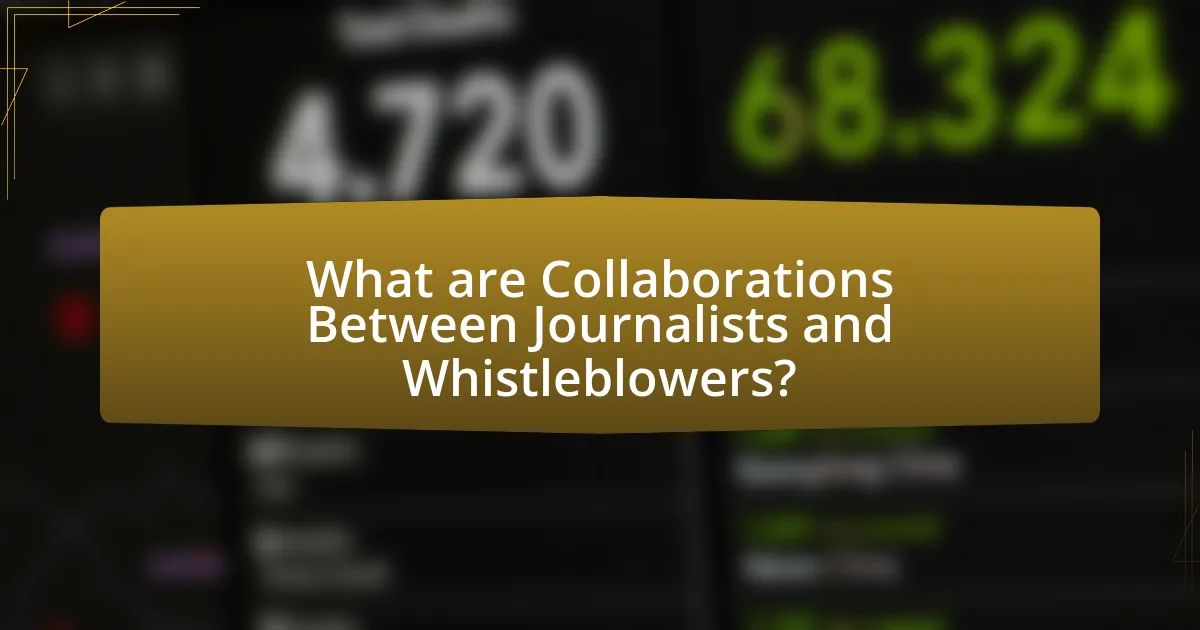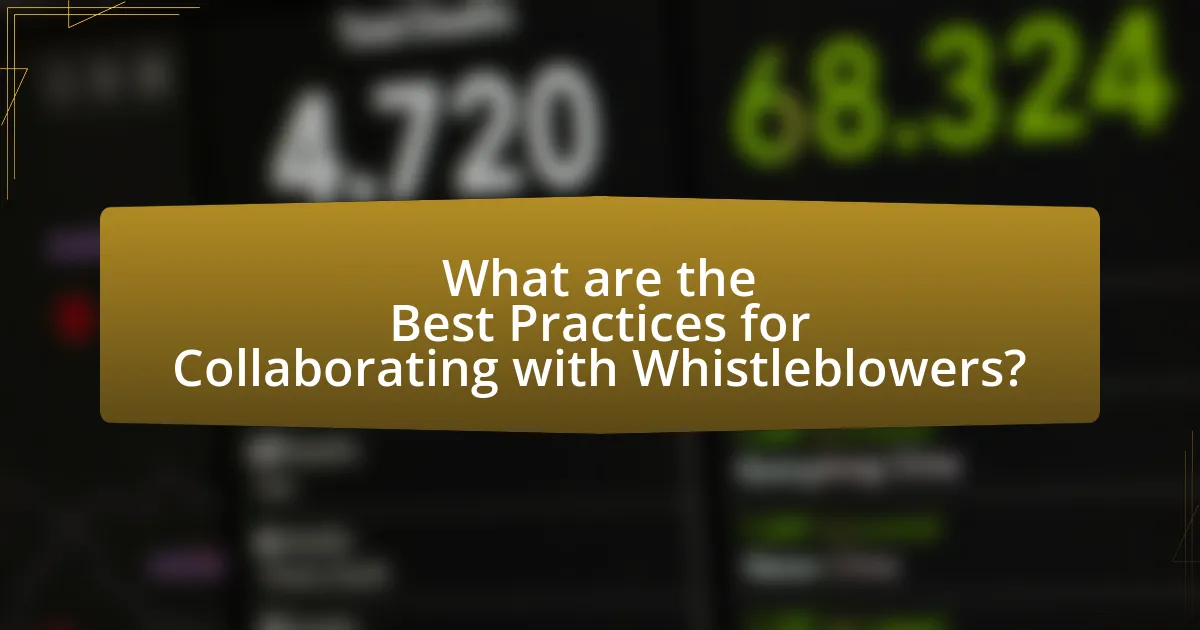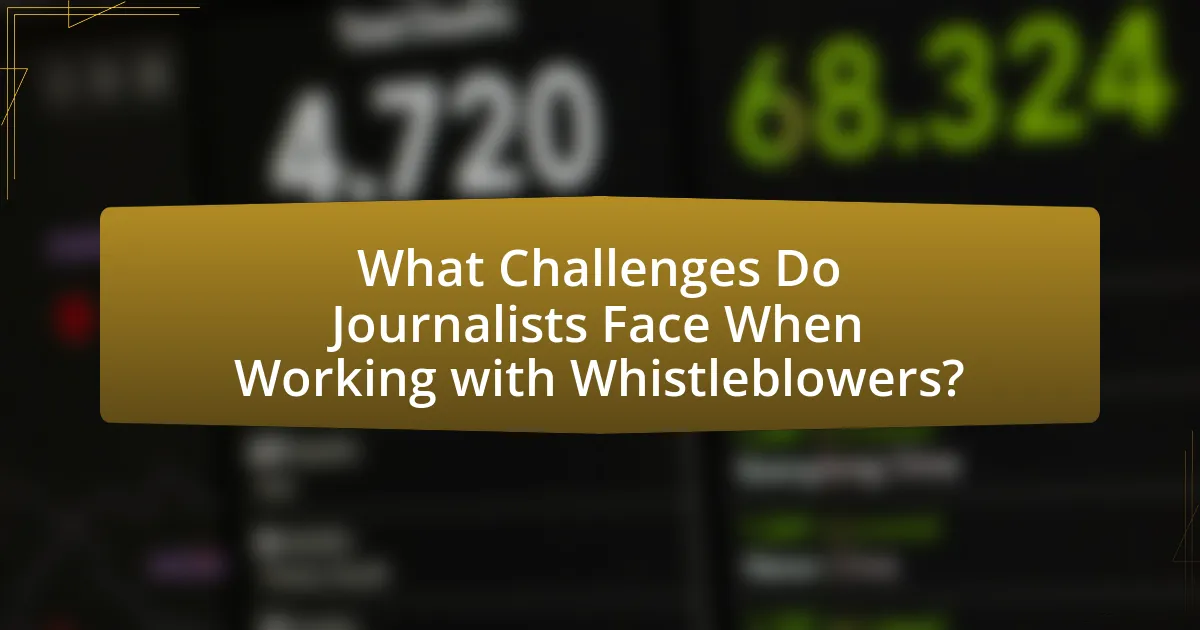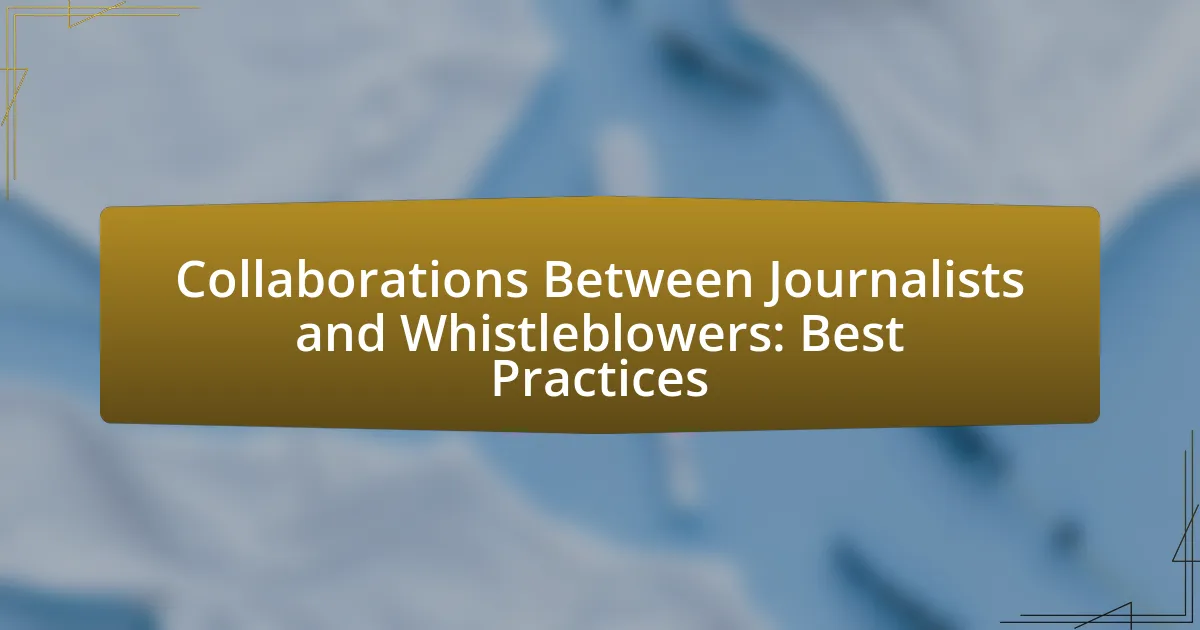Collaborations between journalists and whistleblowers are partnerships that play a vital role in exposing wrongdoing and promoting transparency within organizations. This article outlines the nature of these collaborations, detailing how journalists and whistleblowers work together, the roles each party plays, and the importance of these partnerships for society. It also discusses best practices for ensuring effective collaboration, including establishing trust, maintaining confidentiality, and navigating legal risks. Additionally, the article highlights the challenges faced by journalists in these collaborations and offers practical tips to enhance their effectiveness, ultimately emphasizing the significance of these relationships in fostering accountability and informed public discourse.

What are Collaborations Between Journalists and Whistleblowers?
Collaborations between journalists and whistleblowers involve a partnership where journalists investigate and report on information disclosed by whistleblowers, who expose wrongdoing or unethical practices within organizations. This collaboration is crucial for uncovering corruption, fraud, or abuse of power, as whistleblowers often possess insider knowledge that journalists can verify and present to the public. For instance, the collaboration between journalist Glenn Greenwald and whistleblower Edward Snowden led to significant revelations about government surveillance programs, highlighting the impact of such partnerships in promoting transparency and accountability.
How do journalists and whistleblowers typically collaborate?
Journalists and whistleblowers typically collaborate by establishing a trust-based relationship where whistleblowers provide confidential information about wrongdoing, while journalists investigate and report on these claims. This collaboration often involves secure communication methods to protect the identity of the whistleblower, such as encrypted messaging apps or anonymous tip lines. For instance, the use of secure channels has been emphasized in cases like the Pentagon Papers, where whistleblower Daniel Ellsberg shared classified information with journalists, leading to significant legal and political repercussions. This historical context illustrates the critical role of collaboration in uncovering truths that serve the public interest.
What roles do journalists play in these collaborations?
Journalists play crucial roles in collaborations with whistleblowers by acting as investigators, protectors, and communicators. As investigators, journalists gather and verify information provided by whistleblowers, ensuring that the claims are credible and substantiated. This process often involves cross-referencing documents and conducting interviews to build a comprehensive narrative. As protectors, journalists safeguard the identities and interests of whistleblowers, often employing legal protections and ethical guidelines to prevent retaliation. This is essential, as whistleblowers may face significant risks for their disclosures. Lastly, as communicators, journalists translate complex information into accessible stories for the public, raising awareness about issues of public interest. This role is supported by the fact that investigative journalism has led to significant societal changes, such as the exposure of corruption in various sectors, demonstrating the impact of these collaborations.
What roles do whistleblowers play in these collaborations?
Whistleblowers serve as crucial sources of information in collaborations with journalists, providing insider knowledge that can expose wrongdoing or corruption. Their firsthand accounts and evidence can lead to investigative stories that hold powerful entities accountable. For instance, whistleblowers like Edward Snowden revealed extensive government surveillance practices, prompting significant media coverage and public debate. This role not only aids in uncovering the truth but also enhances the credibility of journalistic investigations by offering verifiable facts and documentation.
Why are these collaborations important for society?
Collaborations between journalists and whistleblowers are important for society because they enhance transparency and accountability in governance and institutions. These partnerships enable the exposure of corruption, misconduct, and human rights violations, which are critical for informed public discourse. For instance, the collaboration that led to the publication of the Panama Papers revealed extensive tax evasion by powerful figures, prompting global discussions on financial ethics and policy reforms. Such revelations not only inform citizens but also pressure authorities to take corrective actions, thereby strengthening democratic processes and societal trust in media.
How do they contribute to transparency and accountability?
Collaborations between journalists and whistleblowers contribute to transparency and accountability by exposing corruption and unethical practices within organizations. Journalists leverage the information provided by whistleblowers to investigate and report on issues that may otherwise remain hidden, thereby informing the public and holding entities accountable for their actions. For instance, the exposure of the Watergate scandal by journalists, aided by whistleblower Mark Felt, led to significant political reforms and increased scrutiny of government actions. This collaboration fosters a culture of openness, encouraging others to come forward with information, which further enhances accountability in various sectors.
What impact do they have on public awareness and policy change?
Collaborations between journalists and whistleblowers significantly enhance public awareness and drive policy change. These partnerships facilitate the dissemination of critical information that exposes wrongdoing, leading to increased public scrutiny and engagement. For instance, the exposure of the Watergate scandal by journalists, aided by whistleblower Mark Felt, resulted in widespread public outcry and substantial political reforms, including changes in campaign finance laws. Such collaborations not only inform the public but also pressure policymakers to address issues highlighted by whistleblowers, thereby fostering accountability and transparency in governance.

What are the Best Practices for Collaborating with Whistleblowers?
The best practices for collaborating with whistleblowers include establishing trust, ensuring confidentiality, and providing legal protection. Trust is crucial; journalists should create a safe environment where whistleblowers feel secure in sharing sensitive information. Confidentiality must be maintained to protect the identity of the whistleblower, as breaches can lead to retaliation and discourage future disclosures. Legal protection is essential; journalists should inform whistleblowers about their rights and the protections available under whistleblower laws, such as the Whistleblower Protection Act in the United States, which safeguards individuals from employer retaliation. These practices enhance the effectiveness of collaboration and promote a culture of accountability.
How can journalists ensure the safety of whistleblowers?
Journalists can ensure the safety of whistleblowers by implementing strict confidentiality protocols and secure communication channels. By using encrypted messaging apps and anonymous tip lines, journalists can protect the identity of whistleblowers from potential retaliation. Additionally, journalists should educate whistleblowers about their legal rights and protections under laws such as the Whistleblower Protection Act, which safeguards individuals who report misconduct. Research indicates that when journalists prioritize these safety measures, they foster a more secure environment for whistleblowers, encouraging them to come forward with critical information.
What measures can be taken to protect their identities?
To protect their identities, journalists and whistleblowers can utilize secure communication tools, such as encrypted messaging apps like Signal or WhatsApp, which prevent unauthorized access to their conversations. Additionally, they should employ anonymity techniques, such as using pseudonyms and secure email services like ProtonMail, which offer end-to-end encryption. Implementing these measures is crucial, as studies show that secure communication significantly reduces the risk of exposure and retaliation, thereby fostering a safer environment for whistleblowers to share sensitive information.
How can journalists create a secure communication channel?
Journalists can create a secure communication channel by utilizing encrypted messaging applications such as Signal or WhatsApp, which provide end-to-end encryption to protect the content of conversations. These applications ensure that only the sender and recipient can read the messages, preventing unauthorized access. Additionally, journalists should implement secure email services like ProtonMail, which offer encryption and do not track user data, further enhancing confidentiality. According to a report by the Electronic Frontier Foundation, using these tools significantly reduces the risk of interception and surveillance, making them essential for secure communication in sensitive collaborations with whistleblowers.
What ethical considerations should journalists keep in mind?
Journalists should prioritize accuracy, fairness, and transparency in their reporting. Accuracy ensures that the information presented is factual and reliable, which is essential for maintaining public trust. Fairness involves giving all relevant parties an opportunity to respond, thereby avoiding bias and ensuring balanced coverage. Transparency requires journalists to disclose their sources and methods when appropriate, particularly when collaborating with whistleblowers, to uphold ethical standards and protect the integrity of the information shared. These considerations are crucial in fostering responsible journalism and safeguarding the rights of individuals involved in sensitive disclosures.
How can journalists balance the public’s right to know with the whistleblower’s privacy?
Journalists can balance the public’s right to know with the whistleblower’s privacy by implementing strict confidentiality agreements and assessing the potential harm of disclosure. By prioritizing the protection of the whistleblower’s identity, journalists can ensure that sensitive information is shared responsibly while still informing the public about critical issues. For instance, the Society of Professional Journalists emphasizes the importance of protecting sources to maintain trust and encourage future whistleblowing, which supports accountability in various sectors.
What guidelines should journalists follow to maintain integrity?
Journalists should adhere to guidelines that prioritize accuracy, transparency, and ethical standards to maintain integrity. These guidelines include verifying information from multiple credible sources before publication, ensuring that all facts are accurate and well-supported. Additionally, journalists must disclose any conflicts of interest and avoid any actions that could compromise their impartiality. The Society of Professional Journalists emphasizes the importance of minimizing harm, which involves treating sources, subjects, and colleagues with respect and dignity. Furthermore, maintaining transparency with audiences about the journalistic process and the sources of information strengthens trust and credibility. These practices are essential for upholding the integrity of journalism and fostering responsible reporting.

What Challenges Do Journalists Face When Working with Whistleblowers?
Journalists face several challenges when working with whistleblowers, primarily related to legal risks, trust issues, and the potential for backlash. Legal risks include the possibility of lawsuits for defamation or breach of confidentiality, as whistleblowers often reveal sensitive information that can lead to legal repercussions for both parties. Trust issues arise because whistleblowers may be hesitant to share information due to fears of exposure or retaliation, making it difficult for journalists to establish a reliable relationship. Additionally, backlash can occur from organizations or individuals being exposed, which may result in threats or harassment directed at both the whistleblower and the journalist. These challenges necessitate careful navigation to ensure ethical reporting while protecting the identities and rights of whistleblowers.
What legal risks are involved in these collaborations?
Collaborations between journalists and whistleblowers involve several legal risks, primarily including defamation, breach of confidentiality, and potential criminal liability. Defamation can arise if the information disclosed by the whistleblower is inaccurate and published by the journalist, leading to reputational harm. Breach of confidentiality occurs when a whistleblower discloses sensitive information that is protected by law or contractual obligations, exposing both parties to legal action. Additionally, journalists may face criminal liability if they are found to be complicit in illegal activities, such as aiding in the unauthorized disclosure of classified information. These risks underscore the importance of understanding legal frameworks and protections, such as whistleblower protection laws, which can mitigate some of these concerns.
How can journalists navigate potential legal repercussions?
Journalists can navigate potential legal repercussions by understanding and adhering to media law, including defamation, privacy, and copyright regulations. Familiarity with these laws enables journalists to minimize risks when reporting sensitive information, especially when collaborating with whistleblowers. For instance, the landmark case of New York Times Co. v. Sullivan established the “actual malice” standard for public figures, which protects journalists from defamation claims if they can prove they acted without reckless disregard for the truth. Additionally, obtaining legal counsel before publishing sensitive material can provide further protection and guidance on ethical reporting practices.
What protections exist for journalists and whistleblowers?
Journalists and whistleblowers are protected by various laws and regulations designed to safeguard their rights and encourage the reporting of misconduct. In the United States, the First Amendment provides a constitutional protection for freedom of speech and press, which is crucial for journalists. Additionally, the Whistleblower Protection Act of 1989 protects federal employees who disclose information about illegal or unethical activities within their agencies. This law prohibits retaliation against whistleblowers and provides them with legal recourse if they face adverse actions.
In many countries, similar protections exist, such as the European Union’s Whistleblower Protection Directive, which aims to create a safe environment for whistleblowers across member states. These protections are essential for fostering transparency and accountability in both public and private sectors, as they encourage individuals to report wrongdoing without fear of retribution.
How can journalists overcome trust issues with whistleblowers?
Journalists can overcome trust issues with whistleblowers by establishing clear communication and demonstrating a commitment to confidentiality. Building rapport through consistent and transparent interactions reassures whistleblowers that their identities and information will be protected. Research indicates that whistleblowers are more likely to cooperate when they perceive journalists as trustworthy and ethical, as highlighted in the study “Whistleblowing in Organizations: A Review of the Literature” by Near and Miceli, which emphasizes the importance of trust in these relationships. Additionally, journalists should provide evidence of their past successes in protecting sources, further reinforcing their credibility and reliability.
What strategies can be employed to build rapport?
To build rapport, active listening and empathy are essential strategies. Active listening involves fully concentrating on the speaker, understanding their message, and responding thoughtfully, which fosters trust and openness. Empathy allows individuals to connect on an emotional level, demonstrating understanding and validation of the other person’s feelings and experiences. Research indicates that these strategies enhance communication effectiveness, as evidenced by a study published in the Journal of Applied Psychology, which found that empathetic interactions significantly improve relationship quality and collaboration outcomes.
How can journalists demonstrate their commitment to ethical reporting?
Journalists can demonstrate their commitment to ethical reporting by adhering to established ethical guidelines, such as those outlined by the Society of Professional Journalists, which emphasize accuracy, fairness, and accountability. By fact-checking information before publication, journalists ensure that their reporting is reliable and trustworthy. Additionally, maintaining transparency about sources and methods fosters credibility and allows the audience to understand the context of the information presented. Engaging in ongoing training on ethical standards and legal issues further reinforces their commitment to responsible journalism. These practices collectively uphold the integrity of the profession and protect the public’s right to accurate information.
What are the common pitfalls in journalist-whistleblower collaborations?
Common pitfalls in journalist-whistleblower collaborations include lack of trust, miscommunication, and inadequate legal protections. Lack of trust can lead to whistleblowers withholding critical information, which undermines the investigation’s integrity. Miscommunication often arises from differing expectations regarding confidentiality and the scope of the journalist’s reporting, potentially resulting in the whistleblower feeling exposed or misrepresented. Additionally, inadequate legal protections can deter whistleblowers from coming forward, as they may fear retaliation or legal repercussions, which can stifle important disclosures. These pitfalls highlight the necessity for clear agreements and robust support systems to facilitate effective collaboration.
How can journalists avoid sensationalism in reporting?
Journalists can avoid sensationalism in reporting by adhering to strict ethical standards and focusing on factual accuracy. This involves verifying information through multiple credible sources before publication, ensuring that the narrative remains grounded in reality rather than exaggeration. For instance, the Society of Professional Journalists emphasizes the importance of accuracy and fairness, stating that journalists should seek truth and report it. By prioritizing these principles, journalists can maintain integrity in their work and foster trust with their audience.
What steps can be taken to ensure accurate representation of whistleblower claims?
To ensure accurate representation of whistleblower claims, journalists should implement a rigorous verification process that includes corroborating evidence and multiple sources. This involves interviewing the whistleblower to gather detailed accounts, cross-referencing their claims with documented evidence, and seeking independent confirmation from other witnesses or experts in the field. For instance, a study by the Government Accountability Project highlights that thorough fact-checking and maintaining transparency in the reporting process significantly enhance the credibility of whistleblower claims. Additionally, journalists should adhere to ethical guidelines that prioritize the protection of the whistleblower’s identity while ensuring that the information presented is factual and well-supported.
What practical tips can enhance collaborations between journalists and whistleblowers?
To enhance collaborations between journalists and whistleblowers, establishing trust and clear communication is essential. Journalists should prioritize confidentiality to protect whistleblowers’ identities, which encourages them to share sensitive information without fear of repercussions. Additionally, journalists must provide a safe environment for whistleblowers to express their concerns, ensuring that they feel heard and valued.
Furthermore, journalists should educate whistleblowers about the journalistic process, including how information will be used and the potential outcomes of their disclosures. This transparency fosters a collaborative atmosphere. Regular check-ins can also help maintain the relationship, allowing for updates and adjustments as needed.
Research indicates that successful collaborations often hinge on mutual respect and understanding, as seen in cases like the Pentagon Papers, where effective communication between journalists and whistleblowers led to significant revelations.

Leave a Reply